How Often Should You Wash Your Sheets & Other Bedding? (It May Surprise Some!)
How often should you wash your sheets? Read below for the ultimate bedding care guide.
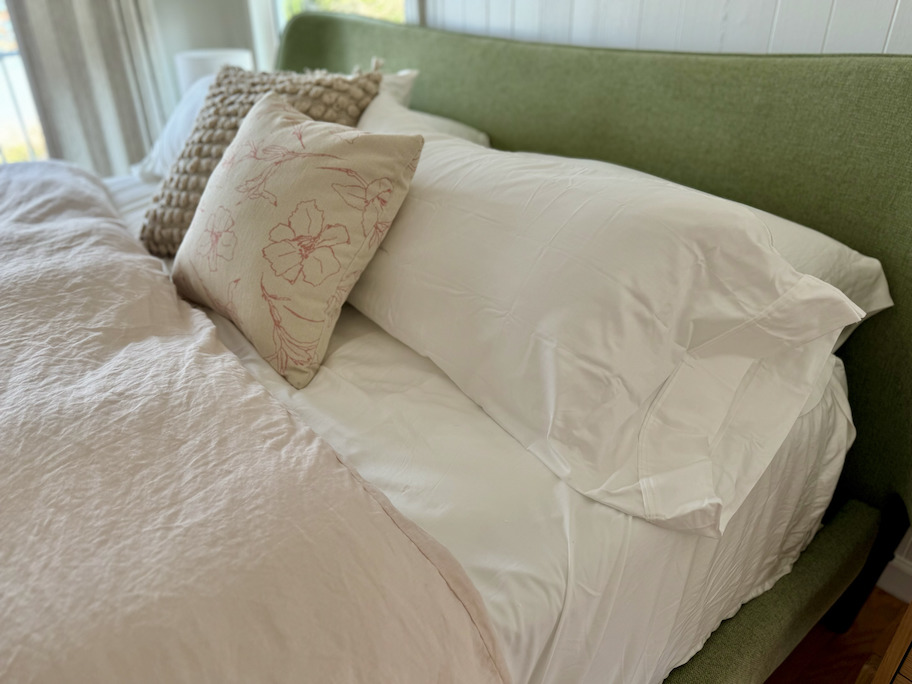
Get a good night’s sleep after you read this.
Most people spend a third of their life sleeping. So how often should you wash your sheets? These shocking facts will surprise you…
Let’s start with what’s actually on your bed?

Let’s get down to the dirty details…
I first need to fill you in on what you’re actually sleeping with besides a possible partner, fur babies, or kiddos because quite frankly, it’s going to shock you. 😳
We shed about 15 million dead skin cells every night. 😳 Even worse, our dead skin cells provide food for thousands of dust mites who are also taking up retail space on our beds – not good for those with allergies! It’s the perfect recipe for dust mites to multiply and over time their fecal matter will build up too. 😬 This is also in addition to fungi and bacteria also found on dirty sheets. YIKES!
If that’s not scary enough, Business Insider shared a study that unwashed pillow cases and sheets had up to 39 times more bacteria than pet-food bowls AND several thousand times more bacteria than a toilet seat. 🤯😱😳😨😬😧😵
So how often are you washing your sheets? We took a poll among our Hip readers:
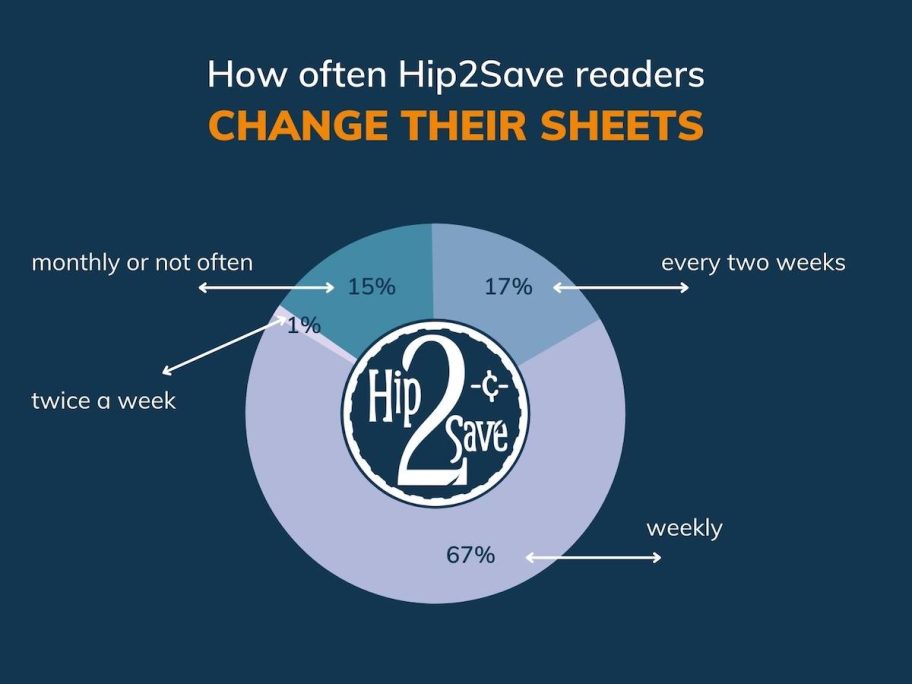
We found that 67% of our Hip readers clean their sheets weekly and just 1% wash them twice a week. So how often should you wash your bedding?
Allergist experts say to wash your actual sheets at least once a week in hot water, so the majority of Hip readers already seem to know how often to clean their bedding.
As for the minority, 17% of Hip readers currently wash their sheets every other week and the remaining 15% wash their sheets monthly or not regularly at all. 😰
Here’s everything you need to know about how often you should clean your bedding and bed:
Layer 1: Mattress

Your mattress is your foundation and many of us have them for years. Taking care of your mattress is important since buying a new one often certainly isn’t practical or necessary.
How often should you clean your mattress?
It’s recommended to clean your mattress every 6 months. Or for a more frequent schedule, clean your mattress when the seasons change.
When and how to wash mattress cover?
Most mattress covers can be washed in the machine, but always check the care instructions to be sure. It’s recommended to wash your mattress cover every 1 to 2 months.

Here are some great mattress-cleaning tips:
- Flip your mattress. Some mattresses cannot be flipped over completely. In that case, rotate it so the foot end is now at the top.
- Vacuum your mattress. This will help get rid of dead skin cells, fungi, and bacteria living on the surface.
- Freshen up your mattress. Easily deodorize your mattress by sprinkling the bare surface with baking soda. Let sit for an hour and vacuum with your vacuum attachment.
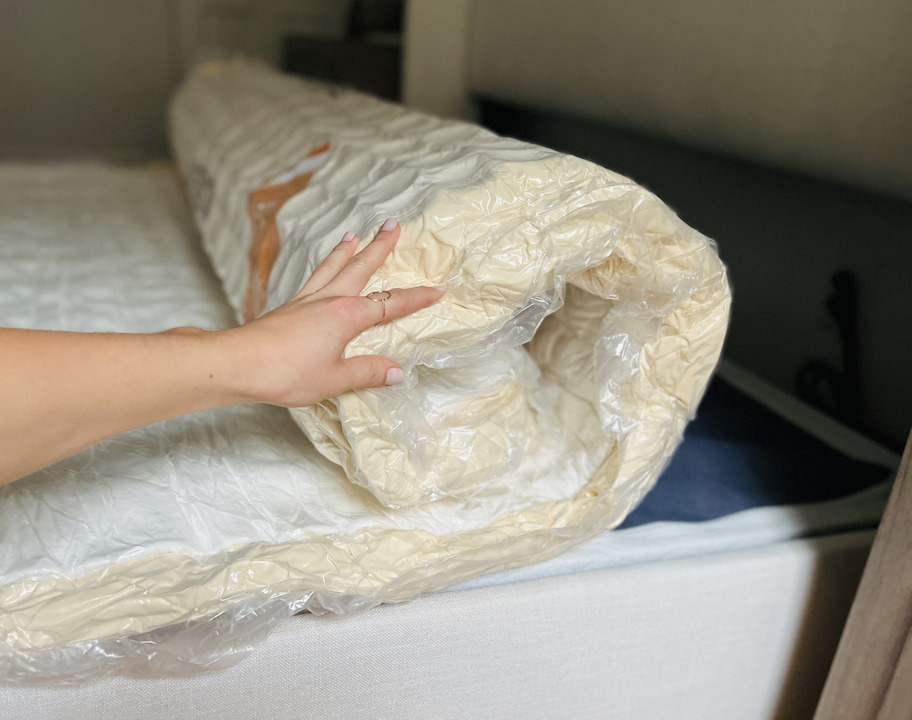
When should you replace your mattress?
It’s recommended by The National Sleep Foundation to replace your mattress every 6 to 8 years due to regular wear and tear. However, the amount of time will vary depending on the design, materials, type of mattress, and the level of use.
Layer 2: Sheets
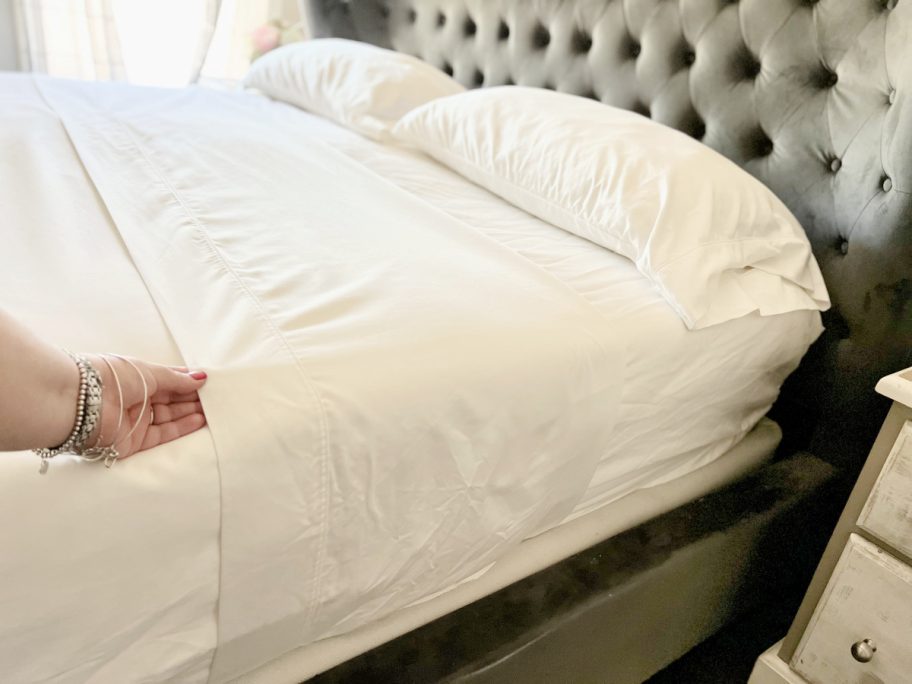
Your sheets are the part of your bed you actually touch most frequently. This includes your pillowcases, fitted sheets, and regular bed sheets.
How often should you wash your bedding & sheets?
Sheets should be washed about every week to two weeks. If you tend to sweat a lot in your sleep you should consider washing the sheets at least every week.
How to wash sheets:
Read our post all about how to wash whites without bleach if you want the best ways to wash your sheets and keep them lasting longer than your previous sets. Plus, our laundry stripping solution could help refresh your current white sheets.

When should you replace your sheets?
Over time, the fibers making up your sheets will begin to break down from frequent use and washing. Using bleach on white sheets will also significantly decrease your sheets’ longevity and can even cause them to change to off-white rather than a brighter white.
Inevitably, your sheets will begin to thin, tear, or develop holes. When this happens it’s time for a replacement.
Layer 3: Sleeping pillows
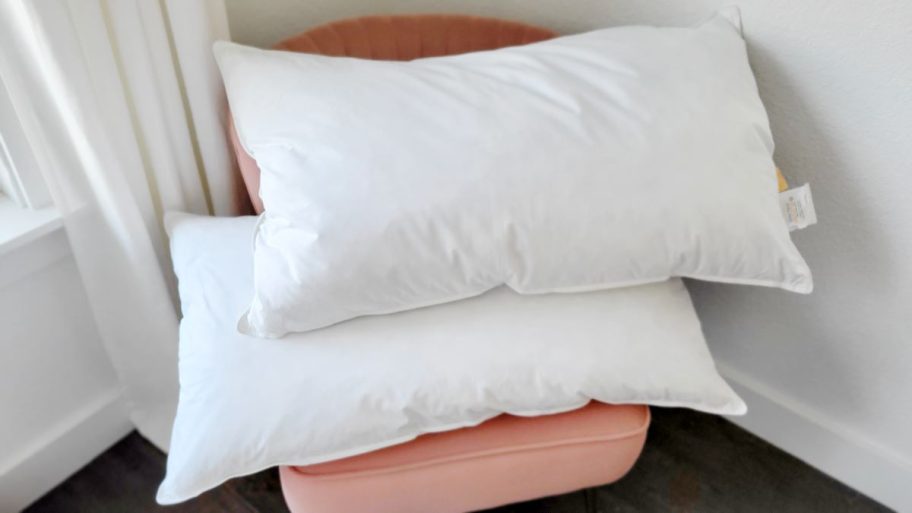
Pillows absorb dead skin cells and body fluids like oils, sweat, and drool each time you sleep on them. Absorbing these on a daily basis (regardless if you have a cover on your pillow or not) takes a toll on the freshness. Dirty pillows will also result in an overpopulation of dust mites which can contribute to allergies.
How often should you wash your pillows?
It’s recommended to wash your pillows at least every 3 to 6 months.
How to wash pillows in washing machine?
Some pillows, like latex and memory foam, aren’t machine washable. However, for cotton, feathers, down, and fiberfill, you can wash them in the washing machine. Here are a few guidelines to follow when washing in the machine:
- Wash 2 bare pillows at a time to keep your load balanced
- Pretreat stains with natural detergent
- Use cold water on a gentle cycle to keep pillows from clumping
- Dry on low heat with tennis or dryer balls until no longer wet
- Reshape and use again
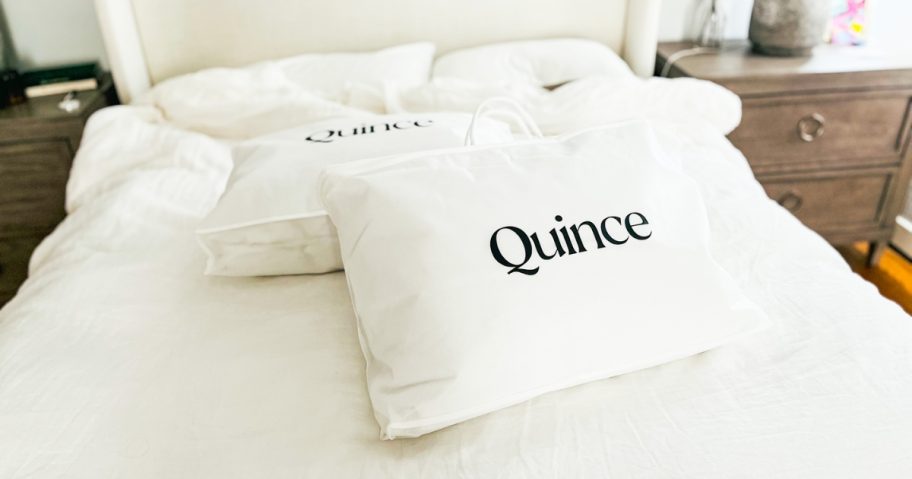
When should you replace your pillows?
If you’re always waking up with neck pain, it may be time to replace your pillow or find one that’s the perfect fit for you. Over time, pillows will lose their shape or become lumpy despite how often you clean your bedding. If you have a down pillow, it may become flat and constantly need fluffing.
The National Sleep Foundation recommends replacing your frequently used pillows depending on the type of pillow you have:
- Polyester or Down Alternative: Replace every 1 to 2 years.
- Polyfoam: Replace every 2 to 3 years.
- Memory Foam: Replace every 2 to 3 years.
- Latex: Replace every 2 to 4 years.
- Down or Feather: Replace every 1 to 3 years.
Layer 4: Comforters and duvet covers

Most people use their larger duvets as decoration and therefore do not need to be washed as often as other bedding essentials. If you’re using sheets your body also isn’t coming into contact with these layers of bedding either. They still collect dust, so washing is inevitable.
How often should you wash your comforter or duvet covers?
Cleaning duvet covers and comforters are recommended to wash just once a month to at least every few months for sufficient cleaning.
How to wash a comforter and/or duvet:
Always read the care instructions before washing a duvet or comforter. Synthetic and down-filled duvets typically have different wash instructions so knowing what kind you have is important. Down-filled duvets should only be put in a front-load washing machine. Avoid using fabric softener and too much laundry detergent and an additional spin cycle may be necessary if you’re comforter comes out too wet. Dry with wool balls and check every 30 minutes to avoid over drying.
How often should you wash your blankets?
Cotton and fleece blankets and quilts that are your middle layer and much thinner can be washed just once or twice a month and about every 3 months for wool blankets.
General guidelines for how to wash blankets:
*Always check the care instructions before washing.
- Fleece – Wash in cold water on gentle cycle. Dry separately to avoid matting.
- Cotton – Machine wash it in cold or warm water and tumble dry it on low heat. Line dry to increase longevity.
- Wool – Spot clean or handwash seasonally or wash on delicate cycle. Line dry.
When should I replace my duvet insert?
Over time the filling of your duvet may settle into the corners or become lumpy. In this case, it can affect your sleep when regulating your body temperature and should be replaced. Replacing them will vary greatly on the quality of your duvet.
Layer 5: Decorative Pillows
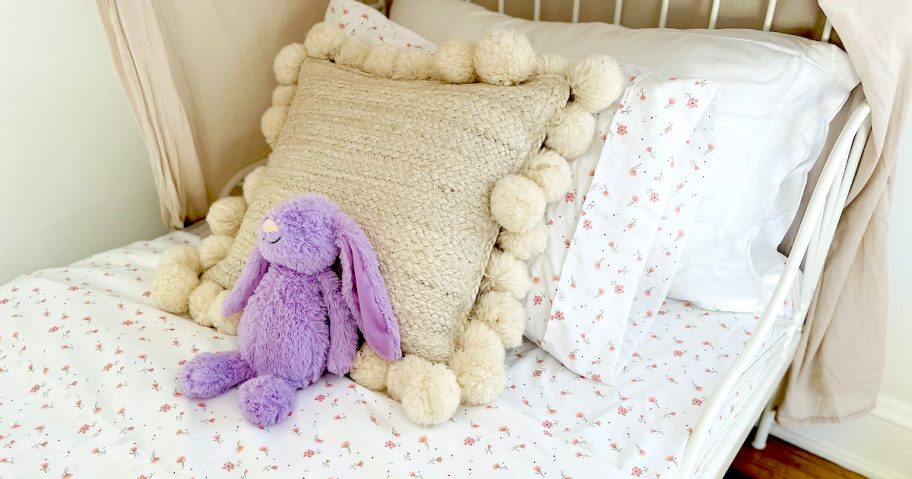
These are pillows that only see the light of day, meaning, they’re just for decoration when the bed is made.
How often should you clean your decorative pillows?
It’s recommended to spot clean as needed and wash every few weeks to maintain freshness and get rid of dust.

When should you replace your decorative pillows?
Every person’s use for decorative pillows can vary so there’s no straight answer. If your pillows are feeling dingy, swap out your inserts as needed. Season changes are a great time to wash your throw pillows or replace them with new ones.
Hip Tip: Score inexpensive inserts on Amazon to keep replacements frugal.
It’s been a year since I tested my luxury bedding for less!

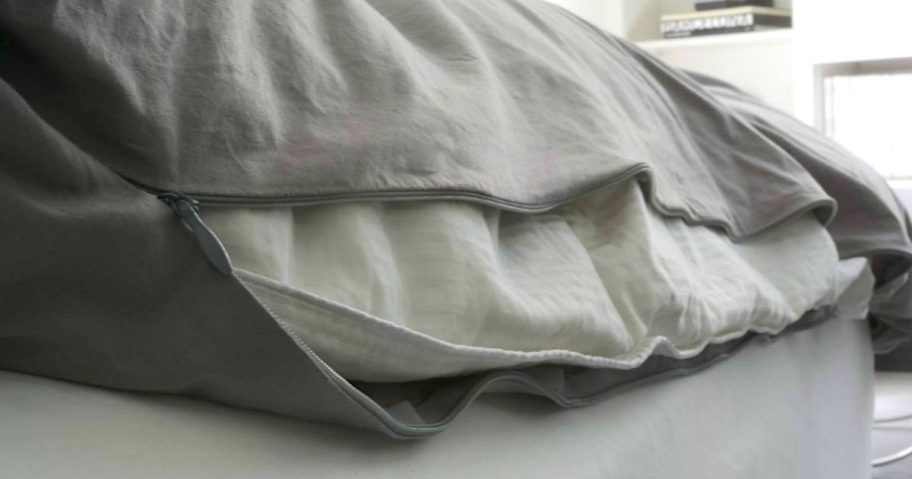

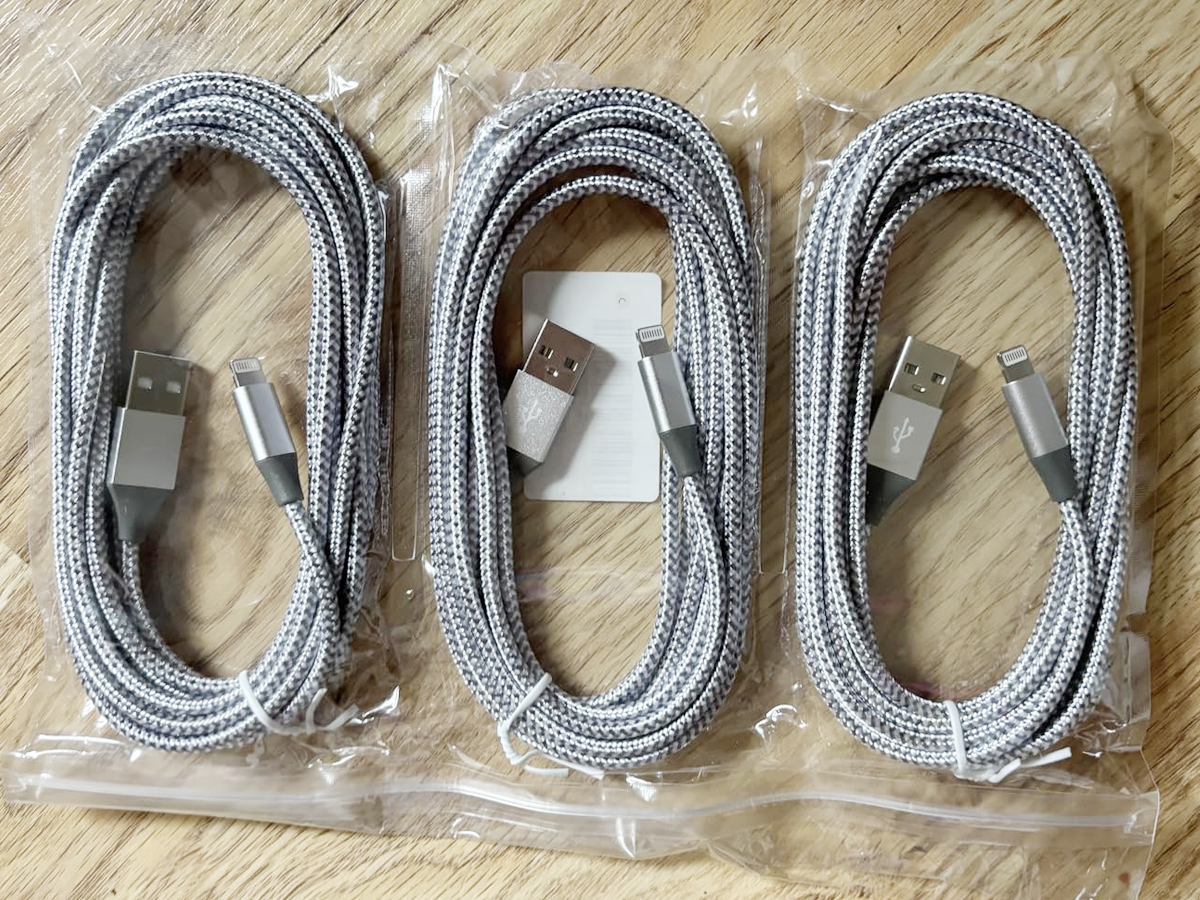
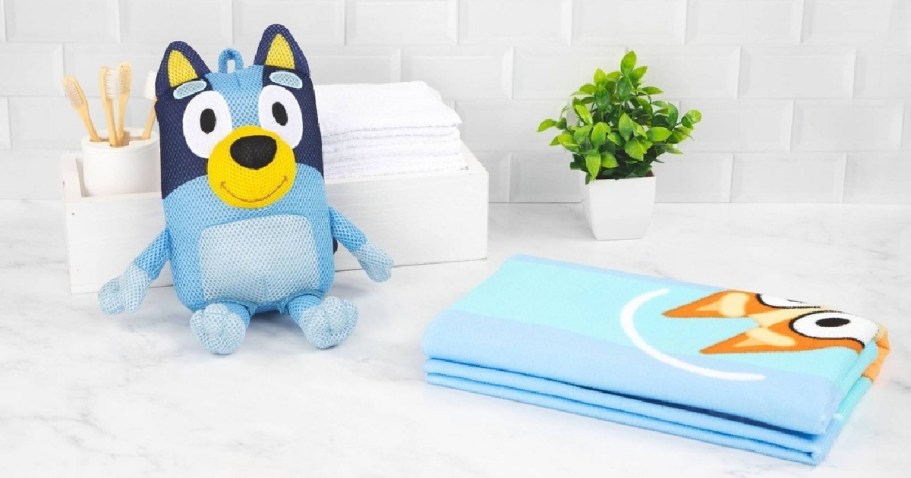
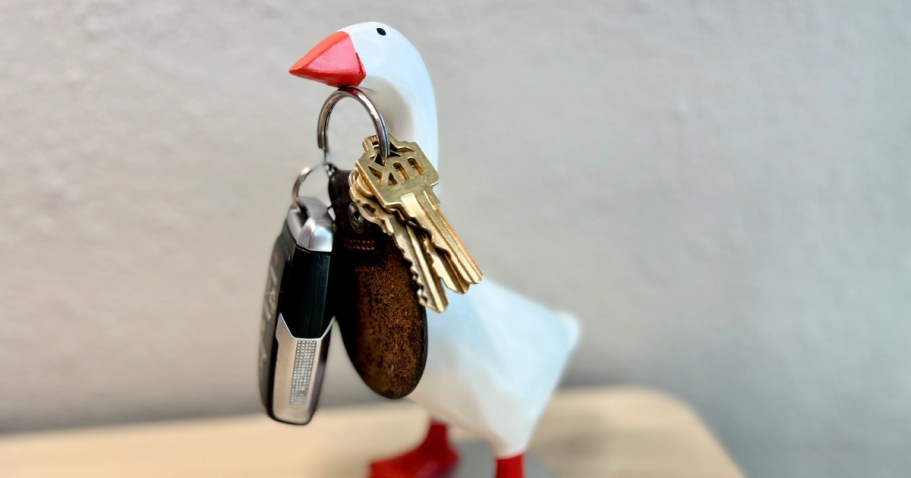
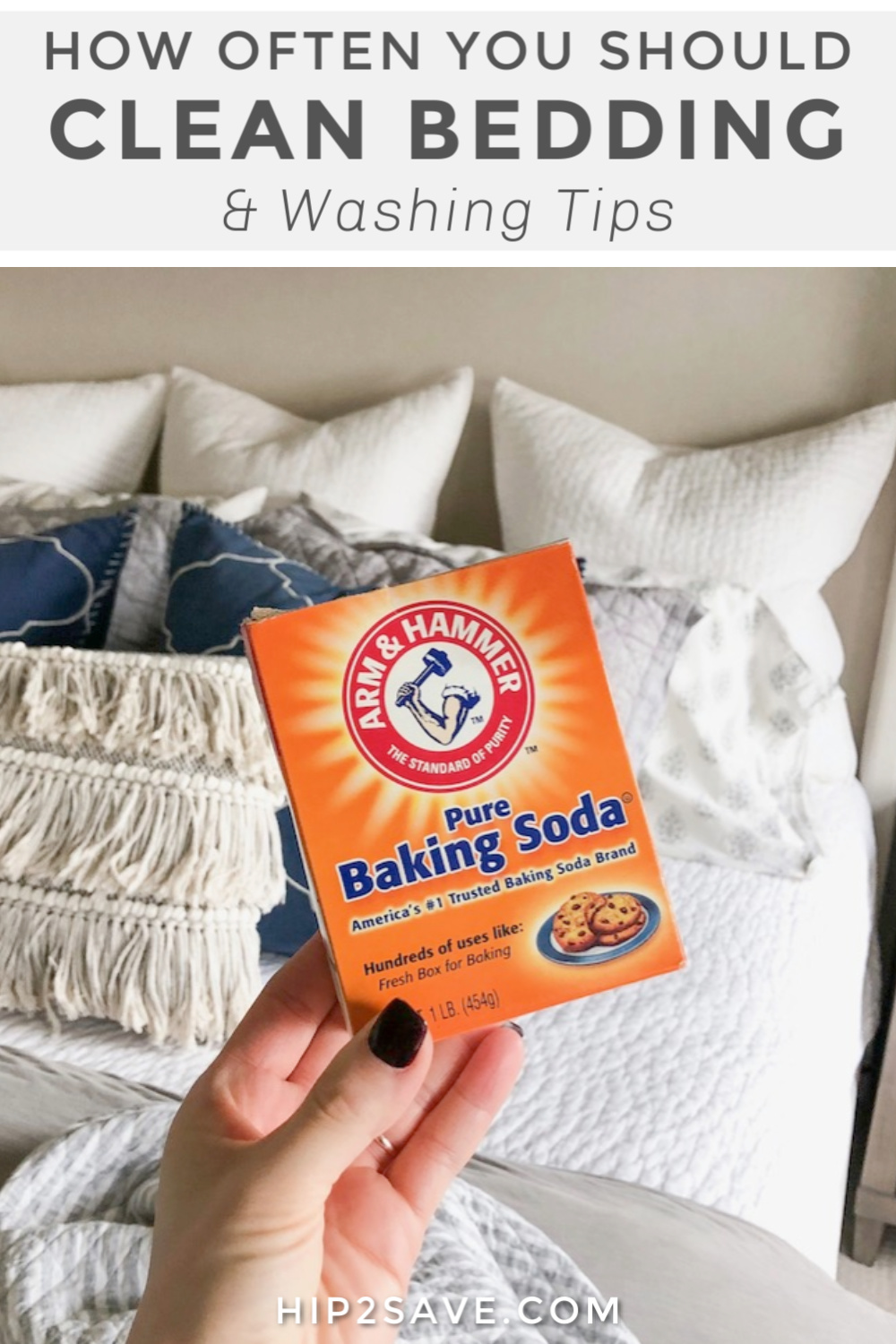
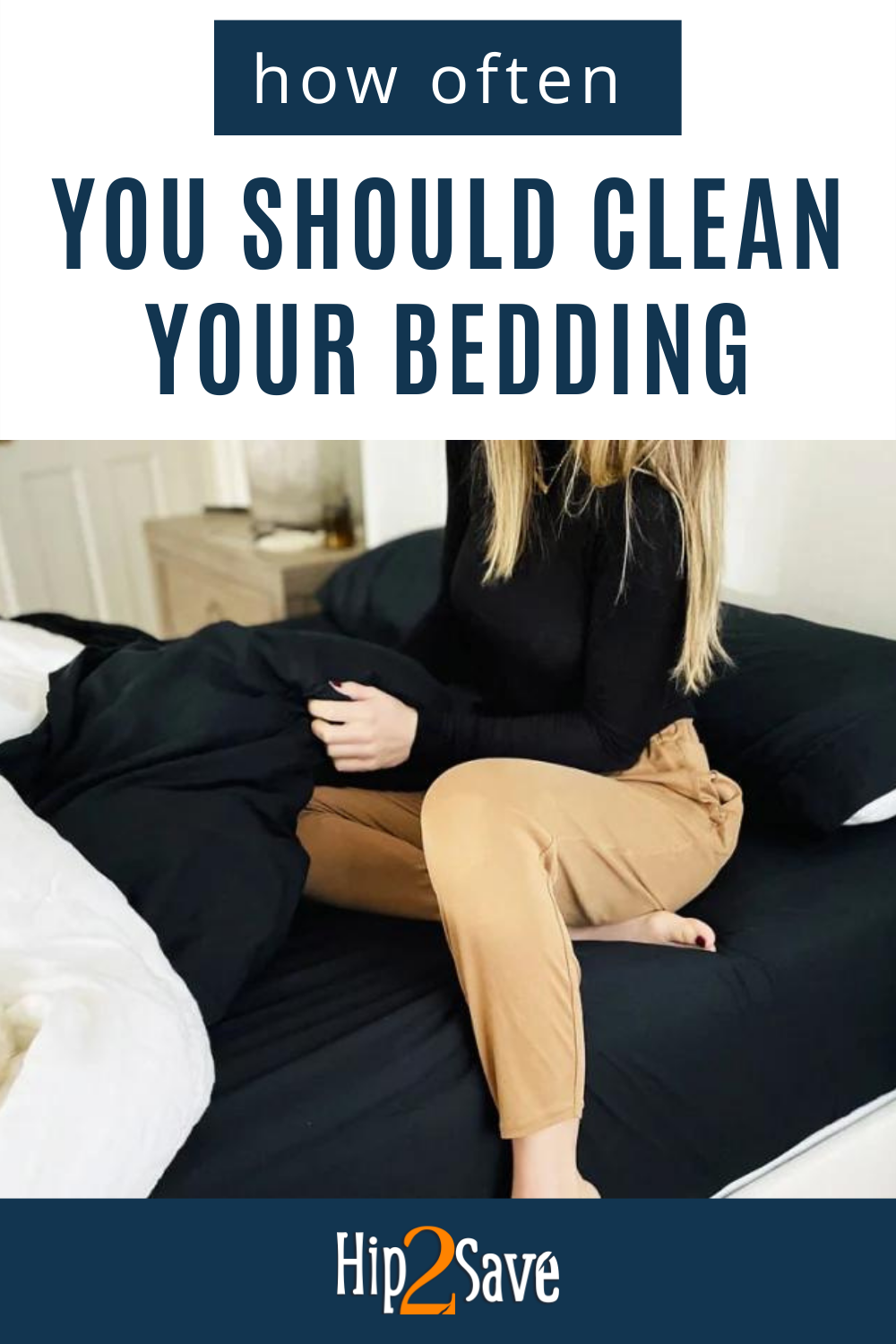

Thank you for the helpful tip about how to clean a mattress. My mattress is just a couple months old and will use the baking soda method to keep it clean.
I wish companies would make things to last. Sheets can be made to last! I have a 100% cotton set that I’ve had since the 80s that is still going strong. Nowadays sheet sets last a couple of years at most before they start to shred. If you can find vintage sheets I highly suggest! The quality “will shock you”. hehe
I change my sheets 3 times a week. Monday, Wednesday, and Friday. We have several sets of some great cotton sheets from Target. One load on Sunday and they are all clean/bleached.
Everything on the bed gets washed every week!
It’s a good practice to wash sheets weekly but people shouldn’t freak out over dust mites and dead cells. We don’t live in a sterile world and there are germs everywhere, even inside our mouth and in our bodies. It’s gross but innocuous.
i think taking a quick shower before bed…or sleeping… makes a difference. Baking soda will also seep into your mattress (and carpet, and vacuum filter) over time making different issues. And i think i would rather lick my matrress before the toilet or dog bowl no matter the state any day…. the germs are way different. i wash mine about 2x a week but don’t have a complex if i don’t
Thanks for hopping into the comments to share your honest thoughts on this topic. ❤️ I also shower before going to bed, and think that makes a difference too. 🤗
100%. If you are clean before going to bed, then the bedding stays so much cleaner!
We have a Sleep Number bed, they last at least 20 years. Our first one lasted 23 years ( it was not top of the line), we’re on our second (and last) bed. Well worth the investment.
Good to know how much you’ve been loving each of your mattresses, Pat! I’ve owned a Sleep Number for 10 years (it was a wedding gift for ourselves 🙃) and was wondering what the lifespan might be of one. We’ve definitely enjoyed it over the years, but also have had a cooling mattress protector on it since day one that also gets washed with other bed linens. Thanks for taking the time to comment! 💕
Jessica, would you mind sharing the brand/type of the cooling mattress protector you have? I’m desperately looking for one that actually keeps me cool. We are also in the market for a Sleep Number bed and if anyone has any recommendations on a specific one they like and why I would appreciate it. We are currently deciding between the p5 and p6. They are expensive so we haven’t made a decision as to whether they will be worth the expense since we’ve never owned one.
We rotated our original entry-level C3 to a rarely used guest room, and at some point replaced the pump on it — and we purchased it in 2001. It still is in great shape. Most of the parts on the bed can be replaced, so even if you lose pressure on it someday, don’t despair–just call them and pay for replacement parts. The newer one we regularly sleep on is about 12 years old, and no parts have ever been replaced. I love, love, love Sleep Number — for us the key was switching out the dual chamber or a single chamber so we both have the “same” sleep number, but no weird thing in the middle of the bed as with dual chambers. It sleeps a lot more comfortably with a single chamber.
I wash the sheets every time there is extracurricular activities which ranges from daily most of the time to weekly or biweekly on bad months 😂 Healthy relationship = more washes